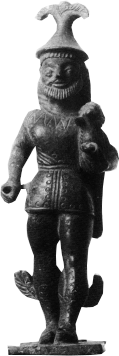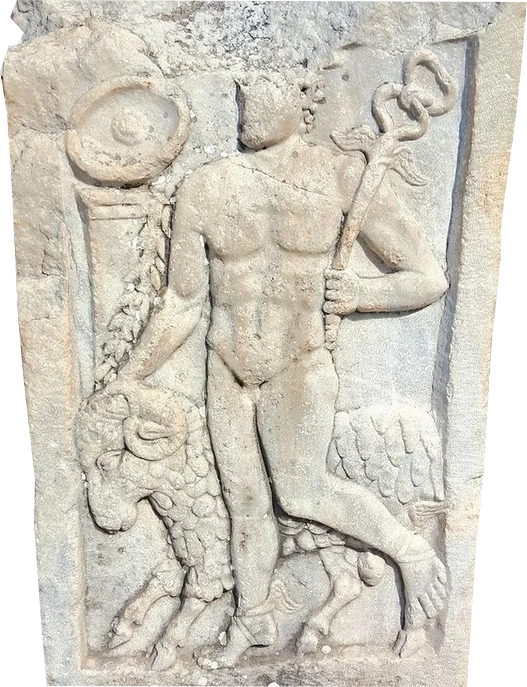Ancient Psychedelia: Alien Gods & Mushroom Goddesses
Online Book - Chapter 11, Page 203
Back to Online Book Mainpage / Next Page (Chapter 12, Page 204)
  R: (43d) Hermes. Domitian Square, Ephesus, Turkey c. 100 AD A stele of Hermes from Ephesus, Turkey, c. 100 AD, shows Hermes with some sort of support column to his left, with something akin to a shield on top, however the image betrays mushroom symbolism as well. He holds a caduceus staff with wings, accompanied by a ram (43d). A statue of Hermes, c. 600-500 BC, depicts him with a hat which could either be perceived as wings or a mushroom, depending on how you would like to interpret it (43f). Agamede was a princess of Elis, the eldest daughter of King Augeias, and was said to be a practitioner of pharmakeia, witchcraft and the mixing of medicinal herbs. She was the consort of Poseidon and bore him a son named Diktys (Dictys), “the Fisherman.” She was described by Homer in the Iliad as “…The golden-haired Agamede, who knew the virtues of every herb which grows upon the face of the earth.” (175) Melampus, known as “black-foot” was a soothsayer and healer who ruled Argos. He was the son of Amythaon by Idomene, or by other accounts, Aglaea or Rhodope, (176) and a brother of Bias. He was considered the first mortal that had been endowed with prophetic powers, as the person that first practiced the medical art, and established the worship of Dionysus in Greece. (177) According to Herodotus, Melampus was the original instructor of Dionysian worship: “For Melampus was the one who taught the Greeks the name of Dionysus and the way of sacrificing to him and the phallic procession; he did not exactly unveil the subject taking all its details into consideration, for the teachers who came after him made a fuller revelation.” (178) According to Diodorus, it was Melampus who brought the story of the Titans to Greece as well: “Melampus also, they say, brought from Egypt the rites which the Greeks celebrate in the name of Dionysus, the myths about Cronus and the War with the Titans, and, in a word, the account of the things which happened to the gods.” (179) He was also said to have taught the Greeks how to mix wine and water. (180) |
When he was a young boy, he told his servant not to kill two snakes, and for this he was supposedly rewarded with the ability to hear animals talk and to be able to communicate with them. Another version has him rescuing and raising the two orphaned snakes after observing their mother being crushed under a cart. For this kind act they licked his ears clean one night and he had been allowed to hear the communication of animals thereafter along with the bearing of the gift of prophecy. (181) This quality is one which is known to be possessed by shamans who have claimed, after taking an entheogen like mushrooms or ayahuasca, they learned how to communicate with animals. Some people have learned how to do this naturally, such as dog and horse whisperers. Orion was born from urine of Zeus, Poseidon and Hermes, according to Ovid, in Fasti: “[The constellation] Boeotian Orion. I should sing the cause of this constellation. Jupiter [Zeus] and his brother who rules the broad sea [Poseidon] were travelling the road with Mercurius [Hermes]. It was the time when yokes bring back the upturned plough and stooping lams milk their bursting ewes. By chance an old farmer of a narrow plot, Hyrieus, spots them, as he stood by his little hut. He said: ‘The way is long, but not the time left, and my doorway is open to strangers.’ “His look, too, strengthened his words, and he asked again. They take his offer and hide their godhead. They pass under the old man's smoke-blacked, filthy roof; a small fire glowed from yesterday's log . . . [he offers the gods food and wine]. Jupiter's [Zeus'] words were: ‘Wish whatever you desire; you shall have it all.’ “The kind man's words were: ‘I had a dear wife, whom I knew in first youth's flower. Where is she now, you ask? Sealed in an urn. I gave her an oath, with you as my witness. “You alone,” I declared, “shall be my wife.” I've kept my word, but my desire has changed. I want to be, not a husband, but a father.’ “All nodded; all stood by the hide of the ox. I am ashamed to speak any further [the three gods urinated on the hide]. Then they blanketed the sodden spot with soil. It was now ten months, and a boy was born. Hyrieus calls him Urion from his mode of birth; then the first letter lost its ancient sound.” (182) Here again, we have the role of urine in the mythology of the deities, similar to the story we read earlier about Aryadeva and Nagarjuna, as well as the story of Uttanka. This also parallels the story of Vajrapani and Rahu. These stories do not include birth by urine, but they do involve urine in relation to religious or classical myth. (175) Healing Gods, p. 356; Iliad, xi, 739-40 (176) Pseudo-Apollodorus. The Library i, 9.1; Diodorus Siculus. Historical Library iv, 68; Scholiast on Theocritus, iii, 43 (177) Pseudo-Apollodorus. The Library ii, 2.2 (178) Herodotus Histories, 2.49.1 (179) Diodorus Siculus, Library of History, I, 97 (180) Athenaeus, ii, p. 45; Eustathius on Homer, p. 1816 (181) Healing Gods, p. 365; https://en.wikipedia.org/wiki/Melampus (182) Ovid, Fasti 5. 493 (trans. Boyle) (Roman poetry C1st B.C. to C1st A |
Go Back to Page 202